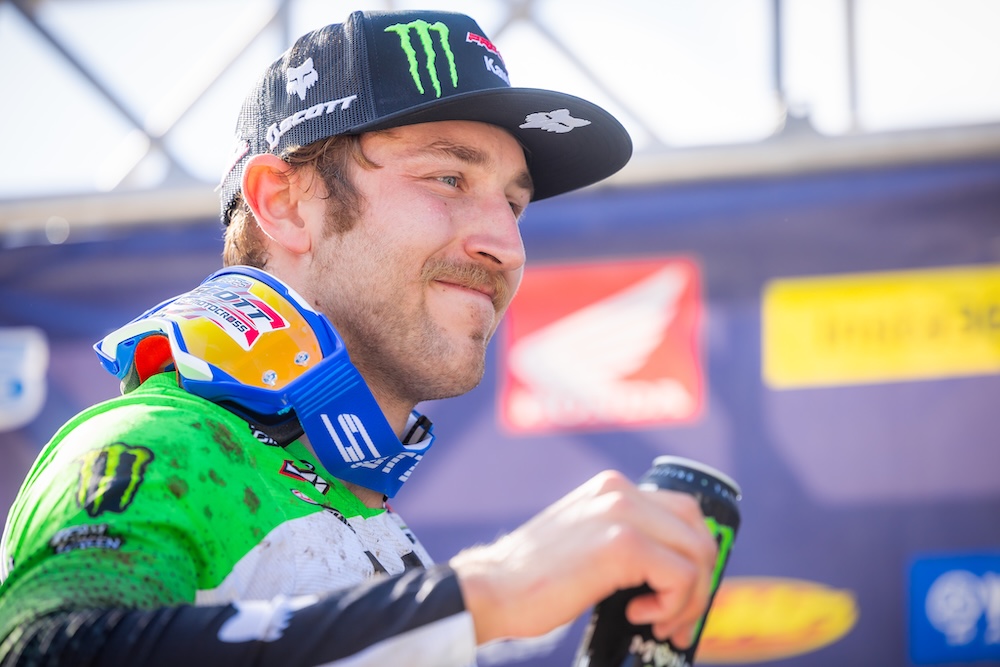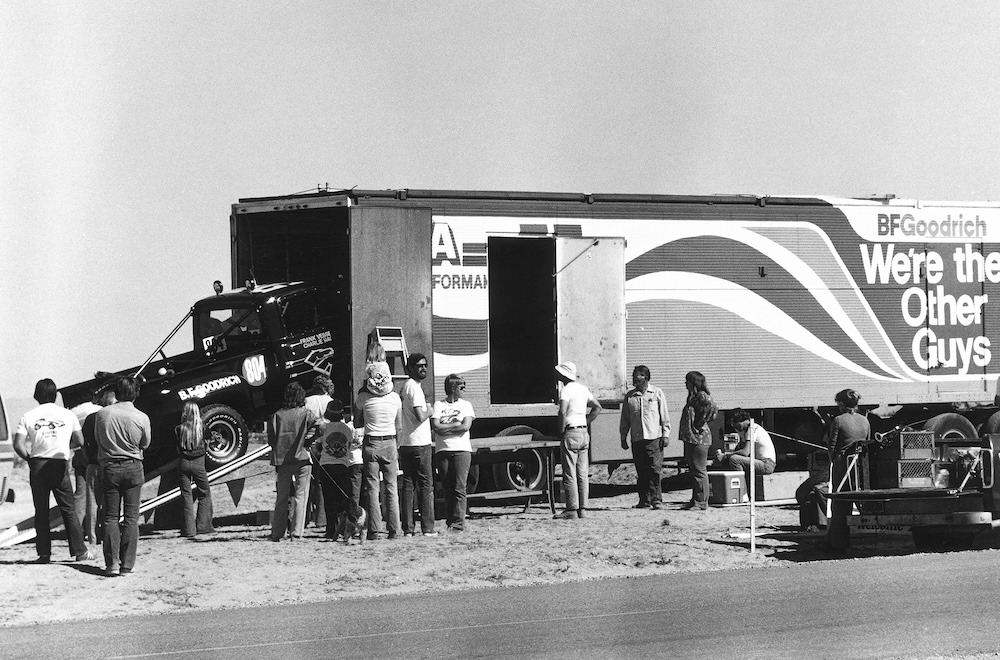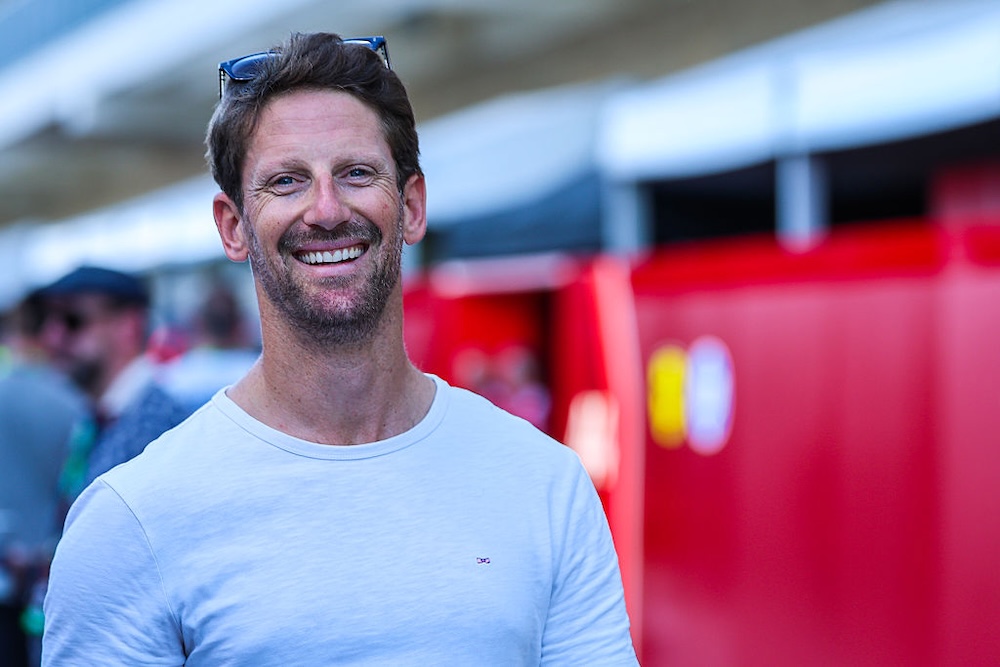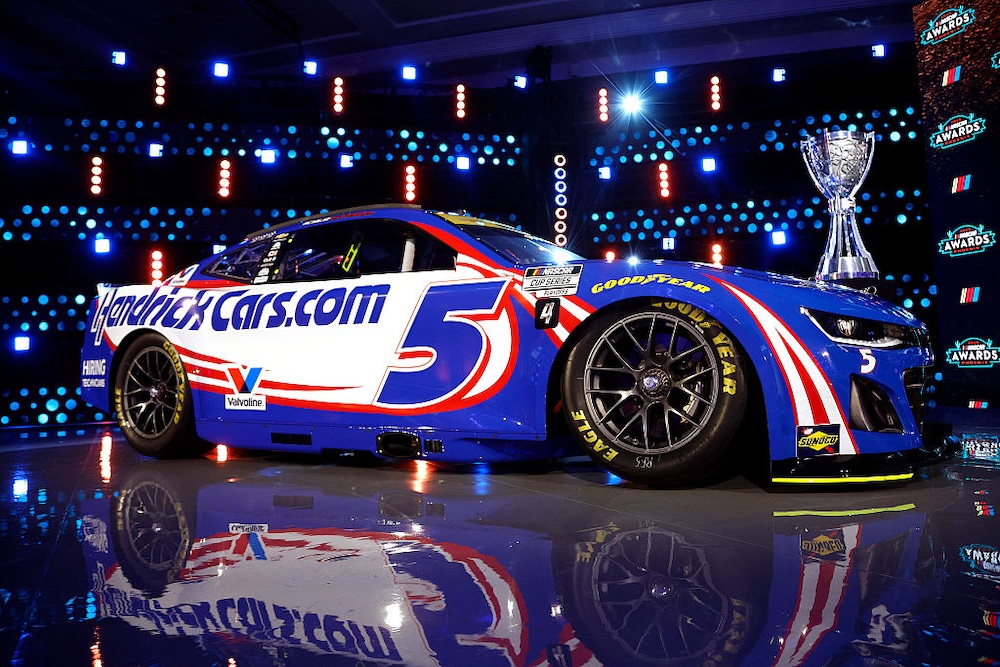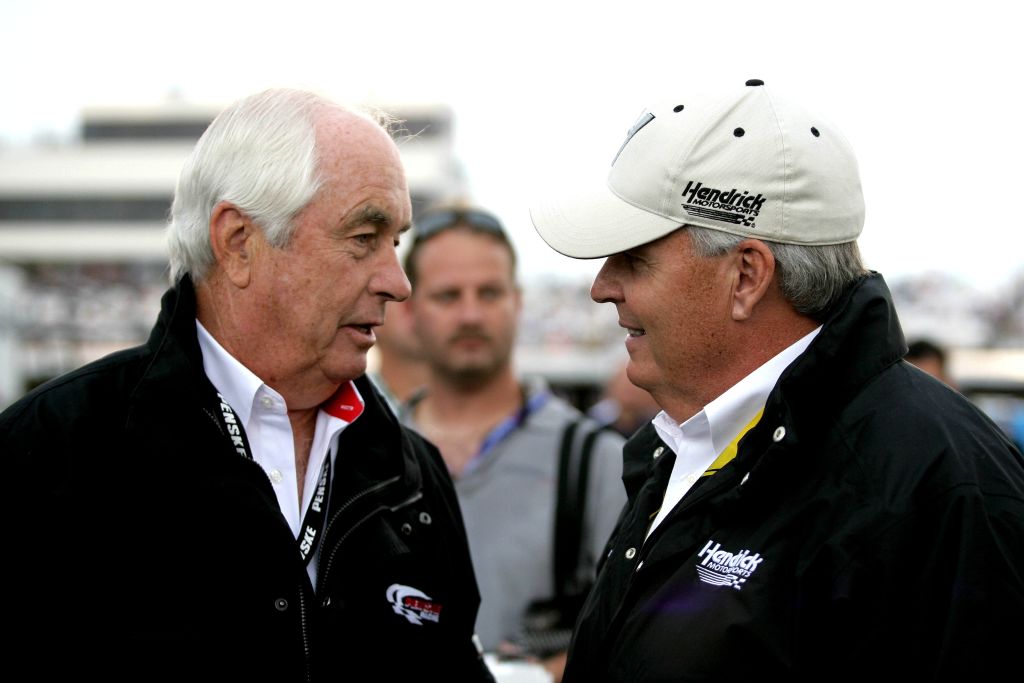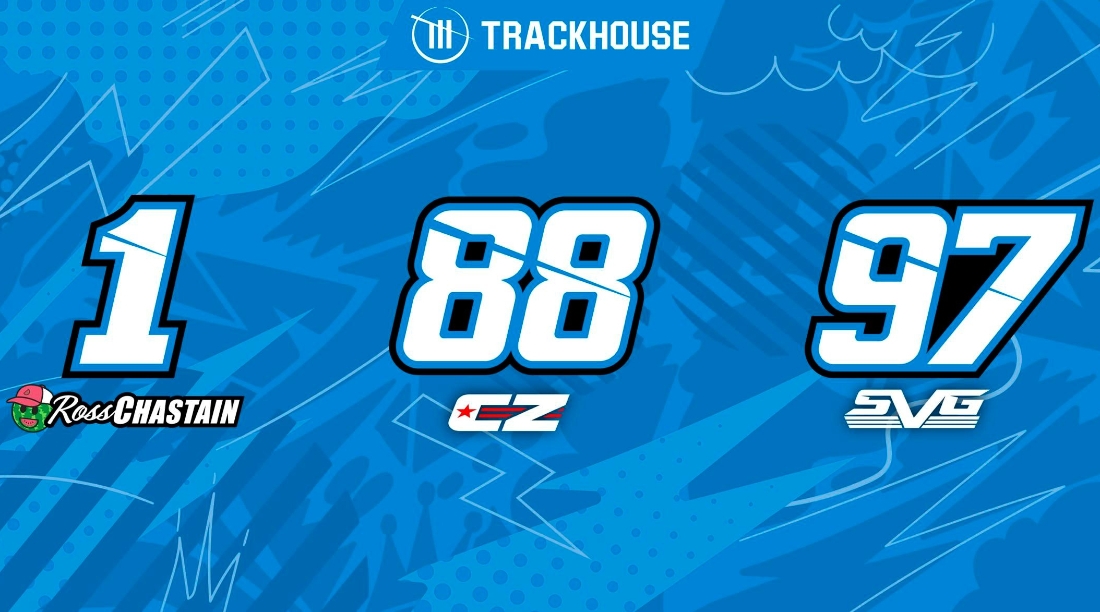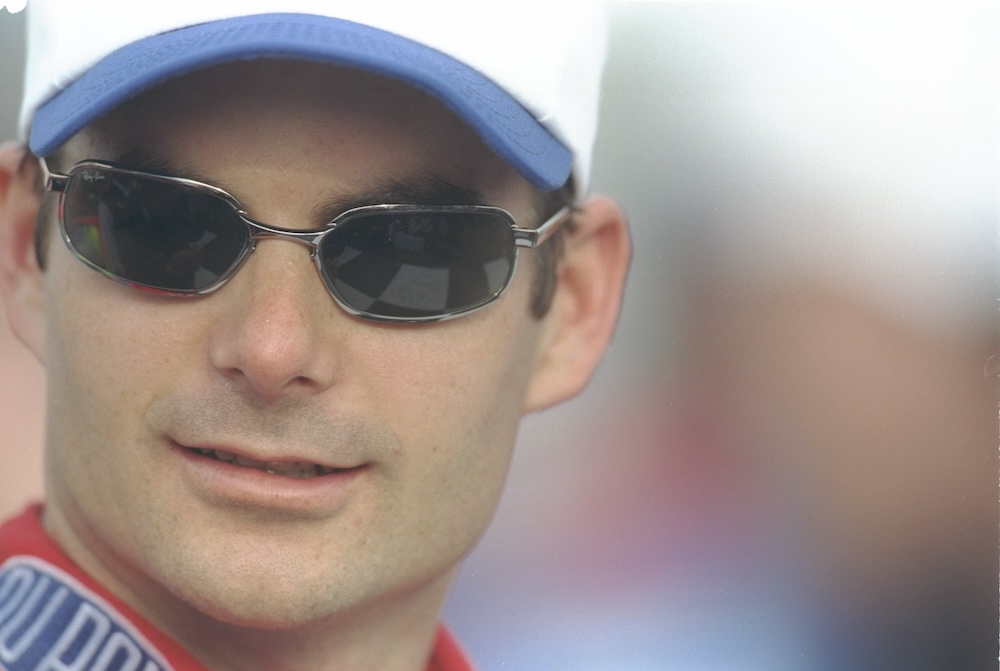
Getty Images
ShareThis is disabled until you accept Social Networking cookies.
From the new RACER magazine: Jeff Gordon's Best/Worst
The new issue of RACER magazine arrives this week, packed with unmissable stories and features and the very best in motorsports photography. As a taster, enjoy the “director’s cut” of four-time NASCAR Cup Series champ and three-time Daytona 500 winner Jeff Gordon’s Best/Worst.
Best career decision?
The game-changer for me was the opportunity that came along thanks to Rick Hendrick and Hendrick Motorsports. At that time I was driving for a good team in what was then called the NASCAR Busch Grand National Series, Bill Davis Racing, and we were racing Fords. I had built a good relationship with both the brand and the team, and it looked like if I was going to move up to the top, NASCAR Cup, it was going to be with them. And then Rick came along… It was a tough decision because I knew there were going to be hurt feelings, and there were still going to be challenges. But I also knew already that it couldn’t be a bad decision because the resources that Hendrick Motorsports had, the type of person Rick is, the commitment I saw there, all made me confident. And it worked out.
Worst career decision?
Unfortunately, it goes hand-in-hand with the best decision: it was how I told Bill Davis that I was joining Hendrick. Bill was getting ready to move up to Cup, and we were having a good season in the Busch Series and yet I knew I’d made this decision to change teams. But we flew up to Chicago together to meet with Target, and I was thinking that this is the right way to do it – help Bill land the big sponsor, and then on I go to Hendrick. The meeting went really well, and as Bill and I came down on the elevator, he was really excited: he said, “Hey, this is it, we’re rolling!” And I said, “Er, Bill, I gotta tell you something…” Well, there was never going to be a good time to tell him this, but that was a really bad time. So yeah, I think that’s my worst decision. I should have told him long before then.
Greatest race?
There was one race at Dover in 1999 where I thought I drove pretty great and led a significant number of laps and we ended up losing. But I think the Brickyard 400 in 1994 was a career-changer for my path because it was only my second win, and for the sport’s path, too, because it was the first time that Cup had raced at Indianapolis Motor Speedway. I’d like to have had my battle against Ernie Irvan play out because unfortunately he got a puncture with five laps to go, but it was still a great race.
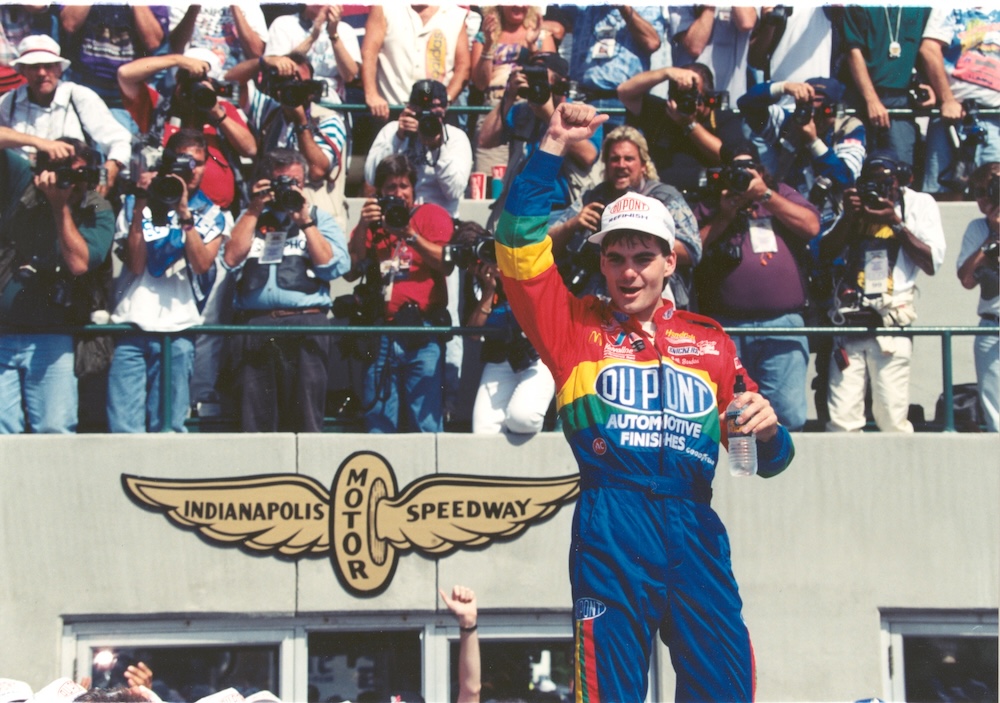
Winning the inaugural Brickyard 400 at Indianapolis Motor Speedway in 1994 elevated Gordon’s status to a whole new level.
Most disappointing race?
Oh, there’s a much longer list for this! One I particularly remember is at Pocono in ’95, when we’d led more than half the race, there’s a late yellow, we came to the restart with seven to go, and I missed the shift from second to third. Terry Labonte just led this freight train of cars past me down that long front straight. It was a terrible feeling, especially for my team who’d given me such a good car.
Actually, there’s another Pocono one where I was disappointed in myself, in 2013. I came up from the middle of the grid and was leading for the final restart, and I was so desperate to not overcook it at Turn 1 that Kasey Kahne got past me. So that’s another one where one of my teammates beat me at Pocono.
But I think maybe worst of all was Texas Motor Speedway in 2014. It felt like we had that race won several times, but then there was a bunch of caution periods near the end. Then on a late restart, Brad Keselowski and I made contact, and it cut down a tire on my car, so I spun and had to pit. After the race, there was a big debacle on pit lane, but I was so disappointed because that result [29th] with just two more races to go took us out of the running for the championship in a year where I thought we had a strong chance of getting it done.
Most significant win?
Again, you could look at the win at the Brickyard in ’94, or my first ever Cup win earlier that year, at Charlotte. But actually maybe my most significant win is my final one [of 93!] at Martinsville in 2015: that holds a lot of sentimental value for me, because my wife and kids were there. They had never gotten to see the years when I was dominating, but that Martinsville win was great because it kept us in the running for the championship in what we knew was my final season. We ended up third in points, but that final win was very special to me.
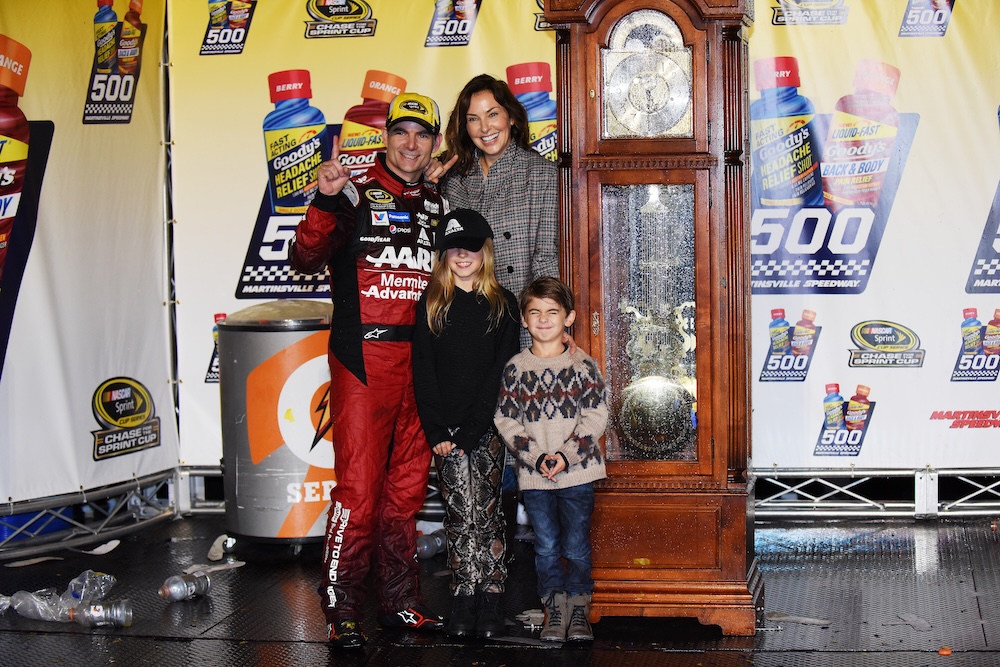
Jeff Gordon’s 93rd NASCAR Cup Series victory at Martinsville Speedway in 2015 was significant for more than it being his final one.
What race win would you love to have on your resume?
Hmm, there’s a bunch: I could say Pikes Peak… but honestly, I would have to say the Indy 500. I grew up watching Indy cars, and the 500 was amazing. My heroes were Rick Mears, the Unsers and A.J. Foyt, so that race was one I dreamt about racing in. Fortunately, the Brickyard 400 allowed me to at least race at the same venue, and winning it a few times [five] helped – somewhat – make up for not getting a chance to compete in the 500.
Who was your best teammate?
One of my first teammates, Ken Schrader, was my best teammate. He had been in the series for about 10 years by the time I got there, and he was a fun-loving good guy, great driver, and an all-around help for a rookie like me. I think he was important to getting me to Cup in the first place because I raced him in open-wheel series, and seeing his talent made me interested in NASCAR and wanting to know more about it. Then when I got there and we ended up as teammates, I could see Ken was supportive of the whole Hendrick organization and open to sharing ideas and information, but also someone who always kept us laughing. We’re still great friends to this day; I love that man.
Who was your worst teammate?
Two answers to this. The first is Ricky Rudd – and we have joked about this recently, by the way. We were only teammates for one season, my first season of 1993, and he did not like me at all. Well, I don’t know if it was personal, or maybe it was the situation, because he’d been with the team three years already and could see it building up momentum and saw himself as the guy who could bring Hendrick its first championship. Having me arrive in a third Hendrick car was probably something he regarded as disrupting that momentum. But then when he left and started his own team for ’94, he and I still got into it. Thankfully, we can laugh about it now.
But the second answer to this question is Jimmie Johnson! Of course, we’re great friends and I had a lot to do with him coming to NASCAR Cup… but damn, the guy just won too much! His arrival slowed my win rate and probably prevented me from getting two or three more championships. I say this in jest, of course.
Best racecar?
Without doubt, the best car I ever drove was the Williams-BMW F1 car in 2003, around the Indianapolis road course. It was amazing. But the best one I raced was the Cadillac DPi-V.R with Wayne Taylor Racing for the Rolex 24 at Daytona. I was with Ricky and Jordan Taylor and Max Angelelli, and that car was just the coolest car I ever raced – amazing grip, in the dry and wet.
My favorite NASCAR car was 2014, and when I say that, I know it hurts the feelings of Ray Evernham [Gordon’s engineer at Bill Davis Racing and then at Hendrick from ’92 to ’99]. But if you look at the 2014 cars in terms of aerodynamics, horsepower, tires and overall raceability, I think the Hendrick Chevys were just great, and they set track records that I think still haven’t been broken.
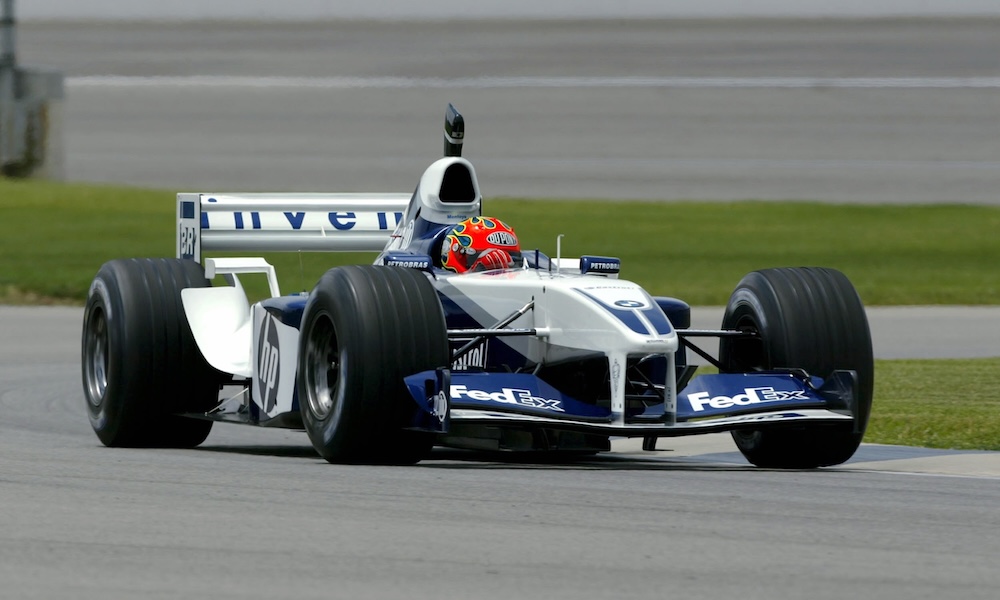
Jeff Gordon was impressive when he tested a year-old Williams-BMW F1 car at Indy in 2003. He says it’s “without doubt, the best car I ever drove.” Getty Images
Worst racecar?
When I first started getting into stock cars and I wanted all the experience I could get, I discovered in USAC midget and sprint cars that I loved the half-mile super-high-banked Winchester Speedway. Well, in ’92, I was invited by the chassis builder Mike Laughlin to drive a Super Late Model at the Winchester 400. Oh my God, it was just a horrific experience! Things were breaking, the car wasn’t fast, I wasn’t fast, nothing went well, and it ended with me crashing out of the race when something broke. Terrible.
Best track you ever raced on?
It’s hard to beat Bristol, because it’s the ultimate exhilaration for a NASCAR driver, to experience the acceleration and cornering ability of a stock car, and for the challenges it offers. The car gets light at the rear as you get into the corner and then loads up heavy on the banking, but you can run the bottom or the top, and you have to manage your tires. Even now, coming to it as a commentator or visitor, I watch it as just a pure fan. And funnily enough, Mark Webber reached out to me and for the second time he’s saying, “Mate, I want to come to Bristol!” I met him at the Abu Dhabi F1 Grand Prix and he was asking me about Knoxville, Eldora, the Chili Bowl, and so on. I had no idea he loved short ovals.
So anyway, I’ve taken him to Knoxville – he loved it – and now he’s reached out again and I’m taking him to Bristol. I think for people who’ve watched NASCAR but not necessarily experienced it, when you see all our races on television, Bristol becomes the bucket-list venue.
If you’d asked me which is the best track I’ve experienced, then hands-down, it’s the Nürburgring. Chevrolet graciously took me there last year when they were testing the Corvette ZR1 and ZR1X so I went through the normal industry pool training and then I got to tool around in the Z06 for a couple of days. And I’ve gotta say, it is the ultimate track: there’s just no other place like it.
Track you wish you’d raced on?
Hmm, as a track to drive on and experience, the Nürburgring, but that would also be my answer to “What’s the most dangerous track you could race on?”! So I think the track I’d have most loved to race on is Spa-Francorchamps. I’ve always loved it and then because my wife is Belgian, I’ve visited there quite a few times and gotten the chance to drive around it. I think it’s a spectacular venue but it’s also really good for racing.
What car from history would you like to have raced?
Having tried out the Williams, I’d have to say F1, but if I was asked which era, that’s a bit more difficult. I think I’d definitely like it to have a V10 naturally-aspirated engine, and rev-matching and heel-and-toeing was never my thing, so I’d definitely go for a paddle-shift. So I guess we’re talking mid- to late 1990s, first half of the next decade.
Advice for someone who wants to start racing?
Like the other guys who’ve done your Q&A, it seems like I’ve been asked this a million times, by parents and kids, and it’s a tough one to answer because you know the number of failures out there versus the number of success stories. But I would say start young and get into the best and safest equipment you can afford, and then try to find the fun in it, because the complication and cost of turning pro can become a grind and it can drain you. If that effort doesn’t feel like work and instead feels like a passion that you want to do for the rest of your life, then you can probably endure the hardships.
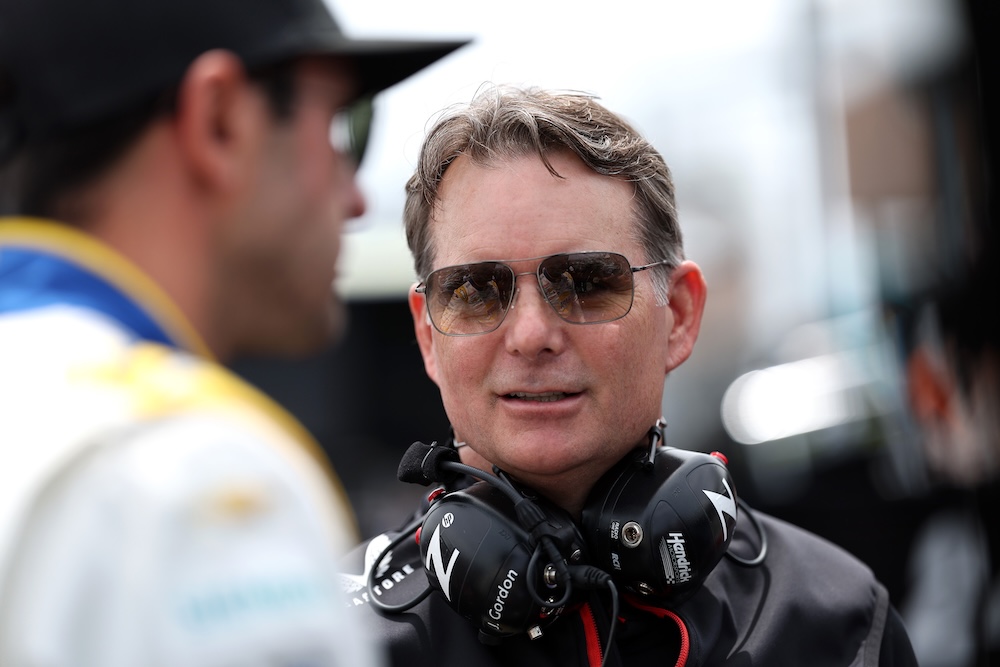
Jeff Gordon’s relationship with Hendrick Motorsports has lasted well over 30 years. Post-driving career, he remains involved as the company’s vice chairman. Getty Images
Whatever your motorsports and performance automotive passions are, you can choose how you enjoy the RACER experience with RACER magazine, the RACER+ App and RACER All Access. Whether you love flipping through pages or streaming exclusive features, we’ve got the perfect plan for you. CLICK HERE and subscribe now for the ultimate motorsports fan experience.
Topics
ShareThis is disabled until you accept Social Networking cookies.
David Malsher-Lopez
David Malsher-Lopez is editor-at-large for RACER magazine and RACER.com. He has worked for a variety of titles in his 30 years of motorsport coverage, including for Racer Media & Marketing from 2008 through 2015, to which he returned in May 2023. David wrote Will Power’s biography, The Sheer Force of Will Power, in 2015. He doesn’t do Facebook and is incompetent on Instagram, but he does do Twitter – @DavidMalsher – and occasionally regrets it.
Read David Malsher-Lopez's articles
Latest News
Comments
Disqus is disabled until you accept Social Networking cookies.
